
April 05, 2011

Count Klemens Wenzel Lothar von Metternich
Loyalty is out of fashion today, but in past times it sustained British and American cohesion and independence. Reactionaries worry about a world where outside threats must be met without patriotism and courage available. An atomized world in which each individual imagines himself to be a lone voice of reason against common cultural prejudices entirely lacks the confidence to defend a way of life.
In Britain today, we face a referendum on a proposal for changing the constitution by incorporating the alternative vote rather than the “first-past-the-post system.” The alternative vote is being touted as more democratic. And through my letter box comes a message from six entertainers”Joanna Lumley, Stephen Fry, Colin Firth, Honor Blackman, and a couple of others”claiming the most remarkable things for this proposed change. Just what I need: a collection of celebrities sharing their wisdom with me. If only we can achieve the alternative vote system, we are told, MPs will work harder, no longer take their constituents for granted, and tackle “jobs for life” in Westminster.
This is tosh. How has this remarkable enthusiasm for political change taken over these famous figures? It is not, I suppose, that celebrities are any more stupid than other people, though some of them certainly are. The problem is that non-celebrities are interested in what celebrities”if you”ll pardon the expression”THINK. It is hard not to acquire a grand repertoire of dubious convictions under these circumstances, but it is unwise. Colin Firth is a notable actor who made quite a good fist from playing a stammering king, but he has let it be known that he is not really a monarchist. Truth to tell, he is something of a republican.
Two interesting pieces of nonsense are in play here. One is sometimes called “Kant’s fallacy” after the great philosopher had suggested that monarchy’s abolition would create a peaceful Europe, because monarchs and not the people were interested in war. A constitutional change could transform the human condition! Kant wrote this in 1790, just as Europe was embarking on a notably bellicose period.
The other piece of nonsense is that there is a single solution”in this case the thing called democracy, or election”to any problem in social and political life. Why do we need a hereditary family when we can have an elected head of state? As a reactionary, my view is that the great thing about the British monarchy is precisely that no one ever elected them. They have good public relations and conspicuous charm, but that is irrelevant to our constitution’s continuity and tradition. Bright radicals have been trying to pull the same democracy trick with the House of Lords for a century now, and no one has yet come up with a popular solution. Who, one wonders with Henry II, will rid us of these meddlesome fools? For reactionaries, that is one of the great historical questions.